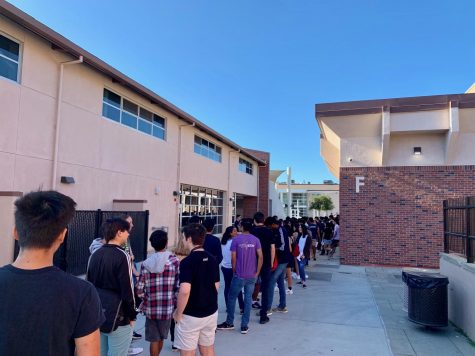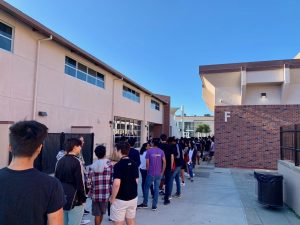Course selection should be more flexible
Scheduling based on seven classes bolsters elective enrollment
The graphic depicts two students. Student on the left has six courses while student on the right has access to all 7 courses.
December 8, 2021
In the past year, K-12 education has suffered a drop of approximately 46,000 students statewide. Even within MVHS, enrollment has decreased from 2,178 in 2017-18 to 1,833 in 2021-22. Among many consequences, courses allocated for MVHS students have fallen and will continue that trend with projections putting MVHS at 1,619 students by 2025.
The decrease in staffing and course offerings affect all subjects. Already, during the 2021-22 school year, every major academic department (English, Social Science, Math and Science) has seen an average drop of 6.5 sections as a result of declining enrollment.
However, electives with fewer total sections such as Computer Programming Java, Principles of Business or Drama are likely to be hit hardest. Hence, MVHS administration decided to “save” or reallocate sections to Drama, AVID and Journalism with one additional section this year that were lost in past years.
In addition to shrinking programs, another consequence is a decrease in teacher job security. As other sites experience the declining enrollment that MVHS has been shouldering for years, FUHSD will no longer hire new teachers and district administration might have to go to a reduction in force, essentially laying off the newest hired members. So far, MVHS has frozen most new hires, bumped many Matador staff to other sites or asked staff to work at two sites, such as Literature teacher Derek Lu and science teacher Ken Gan, who are split between MVHS and CHS.
In order for MVHS to offer a comprehensive education that provides diverse learning opportunities, something needs to change, and students need to have an active seat at the table in deciding their future course offerings beyond simply voting with their top six choices. Currently, two solutions exist.
One, MVHS can guarantee specific elective class periods. When the Drama department saw a drop of one section in 2020-2021, it went from four sections to three. However, MVHS administration decided to guarantee the current four class periods of Drama this year in order to ensure MVHS offers a comprehensive education. Another benefit of this strategy is that it can be used to help teachers remain teaching on a single campus. Because each teacher requires five periods to remain a full-time staff member, dropping to fewer than five total periods would mean a teacher would have to split campuses. However, by guaranteeing a specific course for a specific teacher, it can allow a teacher to remain with five periods at MVHS.
This strategy can be implemented to protect particular courses and teachers from the effects of declining enrollment. We can decide that it’s important to offer business, music, drama, journalism, a variety of world languages and more, as long as sign-ups are reasonable. However, one drawback is an incentive for staff to be responsive to student feedback via course sign-ups. To address this, an advisory board could oversee the course allocation to make sure that staff are doing excellent work and a reasonable number of people are still signing up for the programs.
Another solution is to schedule courses based on seven classes, which carries a significant financial implication but could be elective courses’ saving grace. Right now, MVHS students are guaranteed their first six courses, meaning that their 7th choice isn’t considered when allocating the total number of sections. As a result, most 7th period choices (which are often electives) aren’t counted when deciding which classes will be offered. If we included students’ 7th choice course for those who are interested in taking seven, we’d increase enrollment for electives significantly, ensuring that support for those programs would remain.
However, it is vital to understand the tradeoff and hesitancy to implement such a solution. Currently, faculty are paid in percentages, with 66% of funding going to teachers, 19% to classified staff and 15% going to administration. When there is a budget surplus, the funding is distributed in these percentages and all staff have enjoyed bonuses for the last few years. If MVHS offered more sections, paying $30,000 for each course (which primarily goes to a teacher’s salary), it would take away from the excess funding and decrease the potential for staff bonuses.
Despite that, it’s important that MVHS take action and enact a solution to address declining enrollment’s effect on course offerings, whether it’s guaranteeing elective departments or scheduling based on top seven courses. And in the process of solving this issue, it’s vital that students are at the table to provide input in ensuring course offerings are comprehensive and responsive to student interests.























